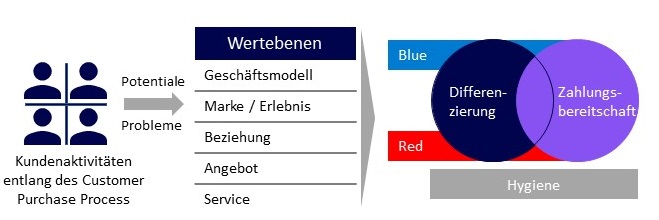
Adapting the existing business model or developing new business models places very high demands on business model consulting. It is not simply a matter of thinking in terms of disruption, white spaces and blue oceans, but rather about the added value for the customer and the value potential for the company.
With our network, we focus on the discovery or verification of customer added value and the safeguarding of an existing customer value potential. For us, the focus is not only on previously unfulfilled customer wishes and technologies, but also on a very deep and comprehensive understanding of the respective customers and also their potential for the company. In addition, our international network allows us to efficiently create an MVP.
For us, however, the consulting business model does not stop at this point. Especially the sale of new business models is completely neglected. Many business models fail due to unrealistic assumptions in the sales area. We therefore think about the sale of new business models from the very beginning. Our customers receive a very high level of customer understanding expertise, the latest models and methods in the form of our DTC approach, the possibility of an efficient first technical implementation as well as our Selling Innovation approach to significantly increase the chances of success.
Our competencies in the area of business model consulting
Customer understanding
Qualitative studies
Quantitative studies
Determination of willingness to pay
Co-creation workshops
Concept
Value proposition design
Business model design
Market potential definition
MVP definition
Minimum Viable Product
International sourcing
Implementation
Testing
Customization
Sale
Sales planning
Competence development
System integration
Content creation
Approach Business Model Consulting
Understanding customer value and worth
In the first step, the existing ideas for new business models are evaluated from an internal perspective. This involves a critical evaluation of the underlying customer insights. Then, in the form of co-creation workshops, the business model ideas are critically evaluated from the customers' perspective. This is based on our unique DTC consulting approach. The result is a comprehensive understanding of customer value and worth.
Concept
When reliable customer insights are available, the value proposition is developed and verified through additional co-creation workshops. Subsequently, the entire business model is worked out. Special attention is given to ensuring that the expectations and assumptions regarding the resources for sales and the objectives are realistic. Finally, the developed business model is critically reviewed through a quantitative customer survey, which also includes the customers' willingness to pay. The result is an assessment of feasibility as well as a quantification of potential.
MVP
For digital business models, we offer in the next step to take over the implementation of an MVP. Due to our international sourcing capabilities, we can offer our clients high efficiency in the implementation of an initial prototype. In addition, we support the development of the business model with further co-creation workshops to ensure a high level of customer orientation.
Sales
Throughout the entire support period, we place special focus on sales and distribution. Too many business models fail due to unrealistic assumptions in this area. Based on our Selling Innovation approach, we assist with strategic and operational sales planning, employee training, system implementation, and content creation. Additionally, we also develop partner ecosystem sales approaches.



